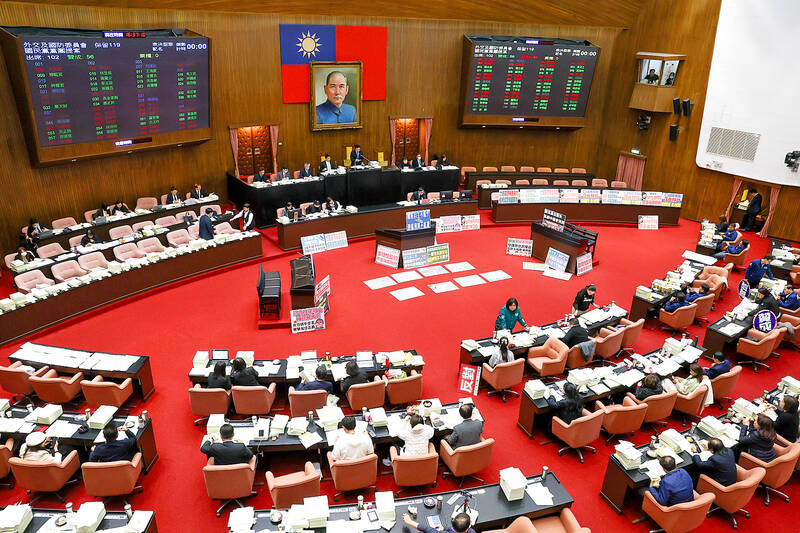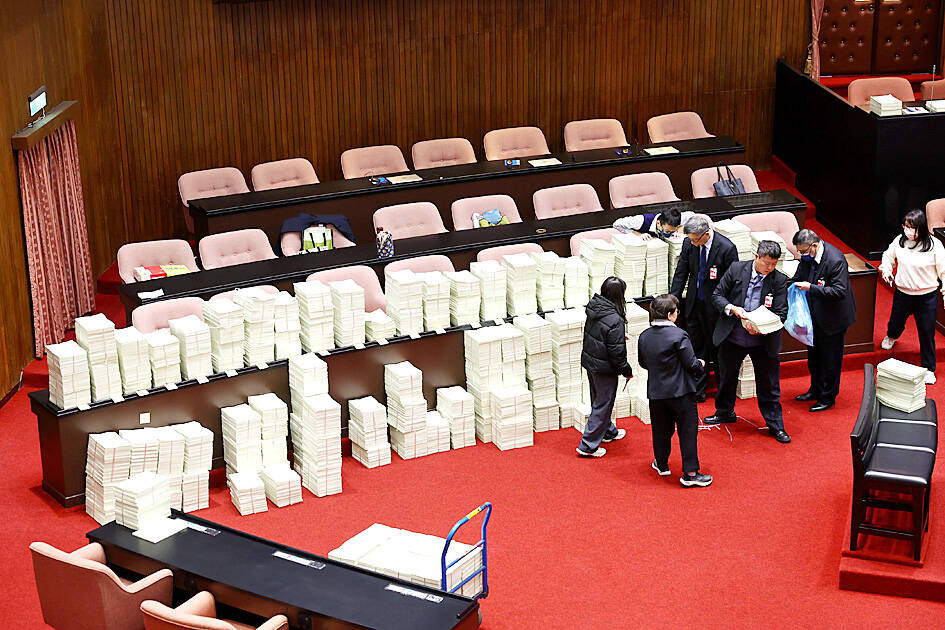Opposition lawmakers’ proposals to drastically truncate the budgets for the National Communications Commission (NCC) and the Ministry of Digital Affairs (MODA) to just NT$1 would affect the launch of new products in Taiwan, undermine work to shore up the nation’s digital resilience, and hinder the government’s efforts to crack down on phone scams and Internet fraud, the two agencies said yesterday.
The NCC was allocated a budget of NT$746 million for this fiscal year, which would cover its personnel and operational costs, the NCC said in a statement.
The operational costs include utility fees and communication fees, but do not include advertising fees, it said, adding that a drastic cut of the NCC’s budget would shut down the agency.

Photo: CNA
“The NCC would not be able to handle certifications of communication equipment used on ships,” the NCC said, adding that it had handled 25,600 certifications last year.
The launch and import of new products such as smartphones might be affected if the NCC ceases to operate, it said.
The budget cut would also impede the commission’s ability to inspect and certify the fixed communication equipment installed within buildings, the NCC added.

Photo: CNA
Telecom carriers’ plans to install new disaster-resistant base stations to combat challenges brought by climate change might also be delayed if they fail to secure NCC certifications for their equipment, it said, adding that it would further weaken the nation’s ability to maintain communication during disasters.
To effectively crack down on phone scams, NCC staff regularly need to inspect telecoms’ retail stores, and they would need a budget for those trips, it said.
Meanwhile, the ministry said that such a drastic budget cut would reverse the country’s progress in tackling Internet fraud.
“We have asked Meta and Google to adopt a real-name system to manage advertisements posted on their platforms. Meta and Line would use [artificial intelligenc] AI to search for scam messages on their platforms and inform us, and we ask them to take down those messages,” Deputy Minister of Digital Affairs Lin Yi-jing (林宜敬) said yesterday.
“Through such collaborative efforts, we have seen a rapid decline in celebrity-impersonation scams or fake advertisements on Facebook. The work would not be able to continue without funding,” he said.
Taiwan faces 2.4 million cyberattacks from overseas and hostile regimes daily, so the ministry’s Administration Cyber Security closely monitors any changes in key infrastructure around the clock, Lin said, adding that the ministry had installed 773 nonsynchronous satellite network receiving stations around the nation and developed a high-altitude communications balloon.
Additionally, the exponential growth in the development of AI technology presents a challenge and an opportunity, and the ministry planned to tackle those through funding, talent, data and AI computing, Lin said.
None of those goals would be realized without a budget, he said.
Opposition lawmakers have also proposed that the Mainland Affairs Council operate on a NT$1 budget as well.
“The council only has a small budget of NT$1 per year, which would be used to fund the work to counter Chinese infiltration and ‘united front’ tactics collect intelligence and conducts assessments. The budget would also have to cover expenses needed to keep Taiwan’s offices in Hong Kong and Macau open. None of these would be possible with just a NT$1 budget,” MAC Deputy Chairman Liang Wen-chieh (梁文傑) said.
Meanwhile, the National Police Agency (NPA) said the proposed budget cut would affect law-and-order police work at all levels.
The agency said it would be unable to protect the public’s safety and the cuts could make it easier for criminals to commit crimes.
The opposition’s proposal to freeze NT$3 billion from the agency’s budget would result in a lack of operating funds, it said, adding that it would likely lead to an increase in money scams, drug smuggling and violence.
People would lose trust in law enforcement, so every citizen could be victimized, the NPA said.
The Ministry of Justice said the opposition’s proposed NT$48 million budget cut for the Taipei District Prosecutors Office and High Prosecutors’ Office would severely undermine their work in prosecuting and fighting money scams, bribery, corruption, drug smuggling and technology-related crimes.
The proposed NT$100 million cut for the Agency of Corrections would reduce medical treatment and counseling for inmates, which would negatively affect their mental and emotional state, and make rehabilitation harder, the ministry said.
Meanwhile, Minister of Agriculture Chen Junne-jih (陳駿季) also called for a rational review of the agriculture ministry’s budget, as they work to prevent the outbreak of African swine fever and help farmers prepare for disasters, such as typhoons.
Additional reporting by Jason Pan and Chen Yu-fu

An essay competition jointly organized by a local writing society and a publisher affiliated with the Chinese Communist Party (CCP) might have contravened the Act Governing Relations Between the People of the Taiwan Area and the Mainland Area (臺灣地區與大陸地區人民關係條例), the Mainland Affairs Council (MAC) said on Thursday. “In this case, the partner organization is clearly an agency under the CCP’s Fujian Provincial Committee,” MAC Deputy Minister and spokesperson Liang Wen-chieh (梁文傑) said at a news briefing in Taipei. “It also involves bringing Taiwanese students to China with all-expenses-paid arrangements to attend award ceremonies and camps,” Liang said. Those two “characteristics” are typically sufficient

A magnitude 5.9 earthquake that struck about 33km off the coast of Hualien City was the "main shock" in a series of quakes in the area, with aftershocks expected over the next three days, the Central Weather Administration (CWA) said yesterday. Prior to the magnitude 5.9 quake shaking most of Taiwan at 6:53pm yesterday, six other earthquakes stronger than a magnitude of 4, starting with a magnitude 5.5 quake at 6:09pm, occurred in the area. CWA Seismological Center Director Wu Chien-fu (吳健富) confirmed that the quakes were all part of the same series and that the magnitude 5.5 temblor was

The brilliant blue waters, thick foliage and bucolic atmosphere on this seemingly idyllic archipelago deep in the Pacific Ocean belie the key role it now plays in a titanic geopolitical struggle. Palau is again on the front line as China, and the US and its allies prepare their forces in an intensifying contest for control over the Asia-Pacific region. The democratic nation of just 17,000 people hosts US-controlled airstrips and soon-to-be-completed radar installations that the US military describes as “critical” to monitoring vast swathes of water and airspace. It is also a key piece of the second island chain, a string of

The Central Weather Administration has issued a heat alert for southeastern Taiwan, warning of temperatures as high as 36°C today, while alerting some coastal areas of strong winds later in the day. Kaohsiung’s Neimen District (內門) and Pingtung County’s Neipu Township (內埔) are under an orange heat alert, which warns of temperatures as high as 36°C for three consecutive days, the CWA said, citing southwest winds. The heat would also extend to Tainan’s Nansi (楠西) and Yujing (玉井) districts, as well as Pingtung’s Gaoshu (高樹), Yanpu (鹽埔) and Majia (瑪家) townships, it said, forecasting highs of up to 36°C in those areas